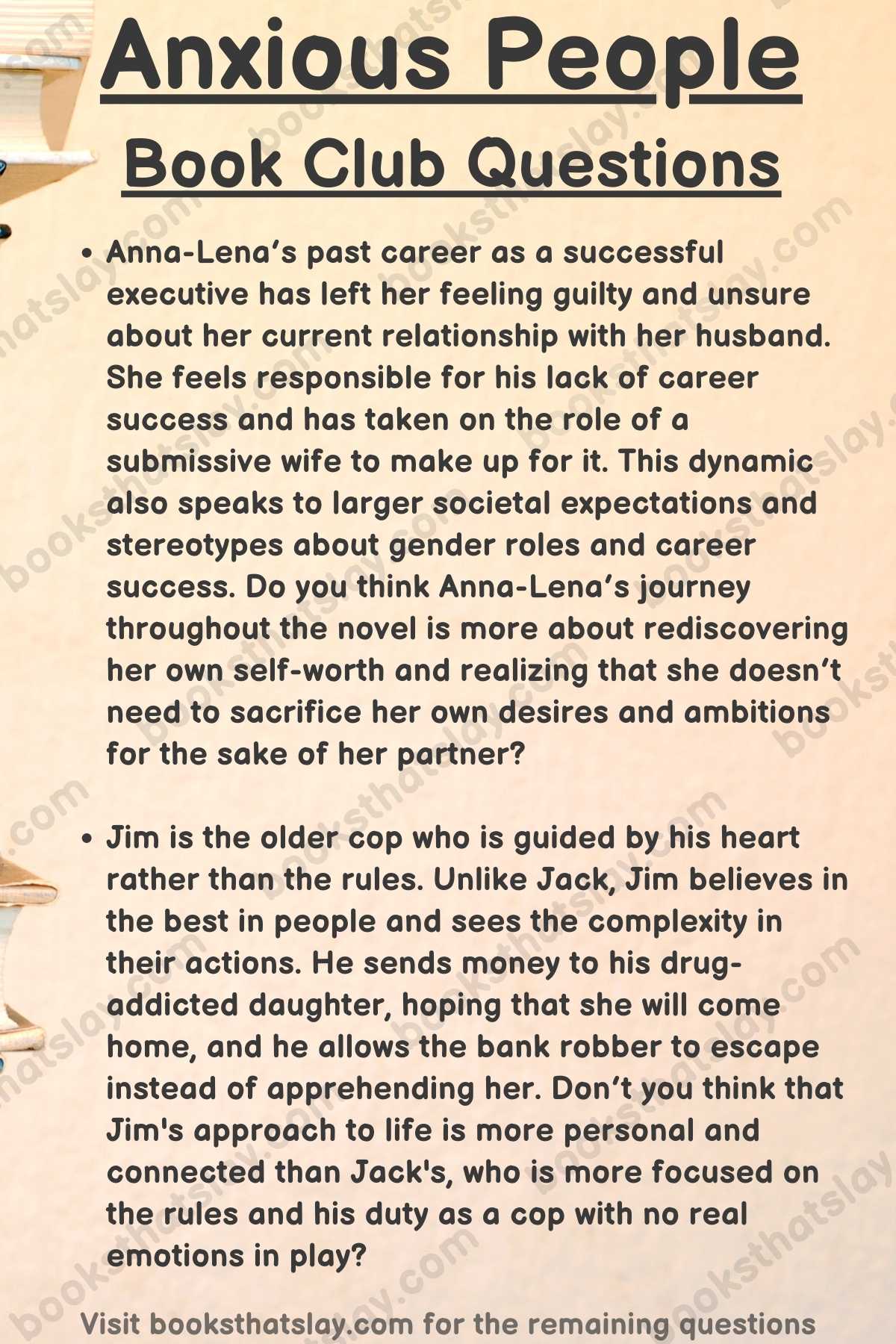10 Anxious People Book Club Questions
Fredrik Backman’s Anxious People is more than just a hostage drama. It’s a hilarious and heartwarming exploration of the human condition.
When a botched bank robbery leads to a group of strangers being held captive in an open house, the stage is set for a comedic yet poignant tale of unexpected connections.
From the eccentric to the ordinary, each character brings their own unique anxieties and vulnerabilities to the table.
As the situation escalates, so too do the revelations, forcing everyone to confront their deepest fears and desires.
Join us as we delve into this captivating novel and explore the complex characters and thought-provoking themes through these discussion questions.
Let’s discuss why Anxious People is a must-read for anyone seeking a blend of humor, empathy, and a deeper understanding of the human heart.
Also Read: Anxious People Book Review

Anxious People Book Club Questions for Discussion
- “Anxious People” is rife with characters seeking redemption and second chances, from the bank robber’s desperate act to preserve her family to Jim’s lenient approach with the people he encounters in his police work. Discuss how the theme of redemption is portrayed through these characters. Are there any characters whose actions suggest a more complex or even a failed attempt at redemption? How do these portrayals impact your understanding of what it means to truly forgive or be forgiven?
- Anna-Lena’s career sacrifices and her subsequent feelings of guilt and role reversal with her husband Roger touch on broader societal expectations about gender roles and career success. How does the novel critique these societal norms through their story? Are there other characters in the novel who also confront or adhere to societal expectations in a way that significantly affects their lives?
- Julia’s fears about her adequacy as a mother, combined with her lack of emotional support, underscore a prevalent theme in the book—parenting under pressure. Discuss how the novel addresses the pressures and anxieties of parenthood. How do different characters manage these pressures, and what commentary does the novel offer on the support systems society provides (or fails to provide) for parents?
- Throughout “Anxious People,” characters reveal their deepest fears, secrets, and wishes, often leading to unexpected bonds, as seen with Zara and Nadia. How does the novel explore the themes of connection and isolation? Consider moments where characters confront their loneliness or find community. What does the novel suggest about the power of vulnerability in forming connections?
- Several characters in “Anxious People” face moral and ethical dilemmas, such as Jim’s decision to let the bank robber go and Zara’s role in the fate of the man who wrote her the note. Choose a few of these dilemmas and discuss how the characters’ decisions reflect their personal ethics and values. What do these dilemmas and their resolutions tell us about the complexity of human behavior and the novel’s view on moral righteousness?
- Anxiety acts almost as its own character within “Anxious People,” influencing decisions and interactions throughout the novel. Discuss how anxiety is depicted through different characters and scenarios. How do the characters’ coping mechanisms for their anxieties differ, and what does this reveal about their personalities and past experiences? Consider how anxiety drives the plot and character development.
- Fredrik Backman often uses humor to address serious themes such as suicide, betrayal, and desperation. How does the use of humor affect your perception of these serious issues? Does it make the characters and their situations more relatable or approachable? Discuss instances where humor is used to reveal deeper truths about the characters or to cope with their circumstances.
- Many characters in “Anxious People” are heavily influenced by their pasts, such as Anna-Lena with her career choices and Jim with his family situation. Discuss how the past shapes the decisions and lives of these characters. Are they prisoners of their pasts, or do they use their history as a means to improve or change? How does Backman use these backstories to enhance the narrative or develop themes?
- “Anxious People” portrays various forms of heroism, from significant sacrifices like Roger giving up his career ambitions, to smaller yet profound acts like Nadia offering emotional support to Zara. Discuss the different forms of heroism presented in the novel. What does the book suggest about the nature of being a hero? How do these actions impact the lives of others in the story?
- The hostage crisis acts as a catalyst for transformation for many characters in the novel. Examine how the crisis affects various characters differently. Which characters experience the most growth or change as a result of this event, and in what ways? How does Backman use this crisis to explore themes of forgiveness, understanding, and personal growth?
If you liked this set of questions, here are some other things for you to explore.